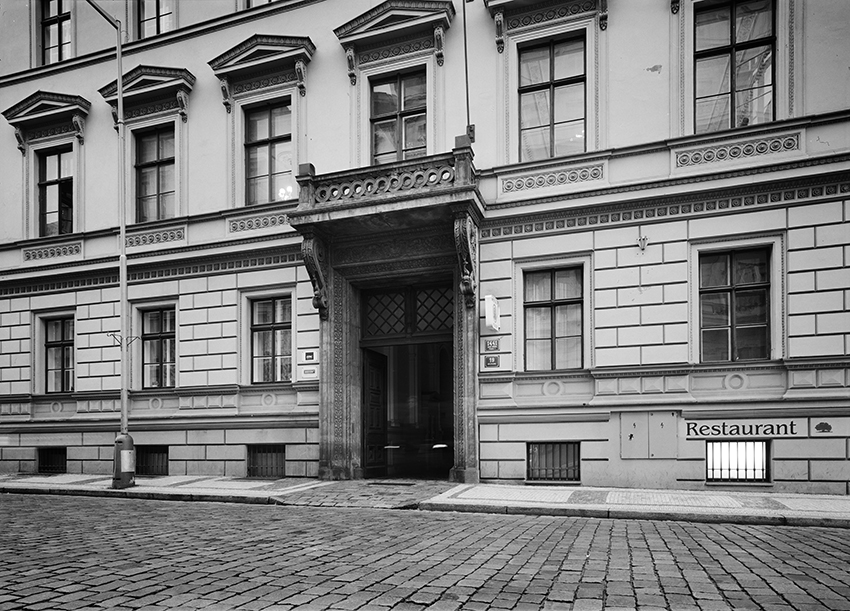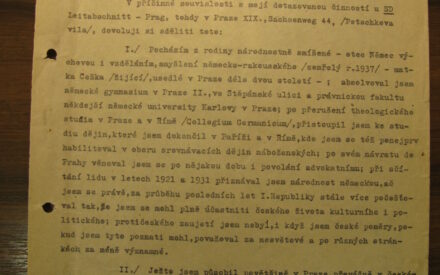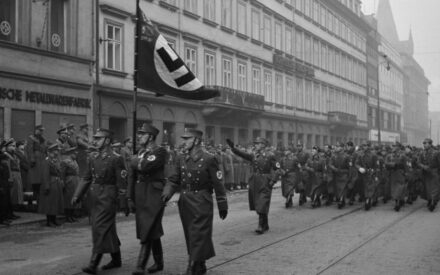
Opletalova 1441/19
This building was the original headquarters for the Prague pobočka of the Sicherheitsdienst. The Sicherheitsdienst, headed by Reinhard Heydrich in Berlin, was a section within SS that, in the Protectorate, also oversaw various police organs as well as the Gestapo. Its primary function, however, was to gather intelligence. In the Protectorate, the Sicherheitsdienst had virtually unlimited power to spy and arrest as they pleased. The information that they generated traveled to the highest levels of power in Prague and Berlin. Much of that information was gathered together into monthly reports, often divided into thematic sections. Smíchovský contributed to the section on the Czech population. He reported on Czech-German relations; the content of Czech-language newspapers; acts of resistance; subgroups such as the Czech fascists; the Czech government within the Protectorate; and a host of matters related Czech attitudes toward Nazi rule.
Smíchovský’s previous connections with the Czech fascists proved especially valuable for the Sicherheitsdienst. His first assignment was to write a report about Rudolf Gajda, among the most prominent Czech fascist leaders in the Protectorate. Smíchovský, who kept his work for the Sicherheitsdienst secret, included information culled from his conversations with fascists and others in his reports. The agency also tasked him to recruit Czech fascists as informers. In his deposition, Smíchovský dismissed the Czech fascists as hooligans and dilatantes who often blackmailed their way to wealth or positions within the collaborationist government. Many within the Nazi regime shared his opinion, considering the Czech fascists to be unreliable elements whose intelligence was questionable and whose violent, uncontrolled public behavior often embarrassed the regime.
The search for informants among the Czech fascists points to one of the many serious problems facing the Sicherheitsdienst and the Gestapo in 1939. In March of 1939 the Sicherheitsdienst did not even have a proper office; agents cultivated informants in hotel lobbies near Opletalova 1441. Precious few occupiers spoke Czech, or even possessed the most basic understanding of Czechoslovak history, politics, and culture. Thus, they were at first forced to turn to Sudeten Germans, many of whom had been members of Konrad Henlein’s Heimatfront, or various unseemly elements within Czech society as the Czech fascists. They also suffered from a lack of organization, even unruliness, within their own ranks. According to Smíchovský, the man to whom he answered within the Prague Sicherheitsdienst, Leopold Übelacker, was notorious for going on drinking binges with Czech informants, as well as playing dress up with various undercover uniforms. He was finally imprisoned and sent to a concentration camp in 1941 for impersonating a Gestapo officer. He would later work for the Sicherheitsdienst in Brno before being drafted into the Wehrmacht in 1944, Smíchovský wrote.
What Smíchovský does not mention is that Übelacker held a number of Czech fascists under his protective wing. By 1941, and the arrival of Reinhard Heydrich, their star had fallen, so perhaps Übelacker’s star had fallen as well. Whatever the truth may be, it is certain that the SD and the Gestapo seemed anything but brutally efficient organs of terror. They struggled at first, relying on the least reliable members of the population. Key figures, such as Übelacker, appear to be remarkably incompetent. How, then, did Nazi system of surveillance – and terror – come to be so devastatingly successful?
Další místa na téma "Collaboration"



